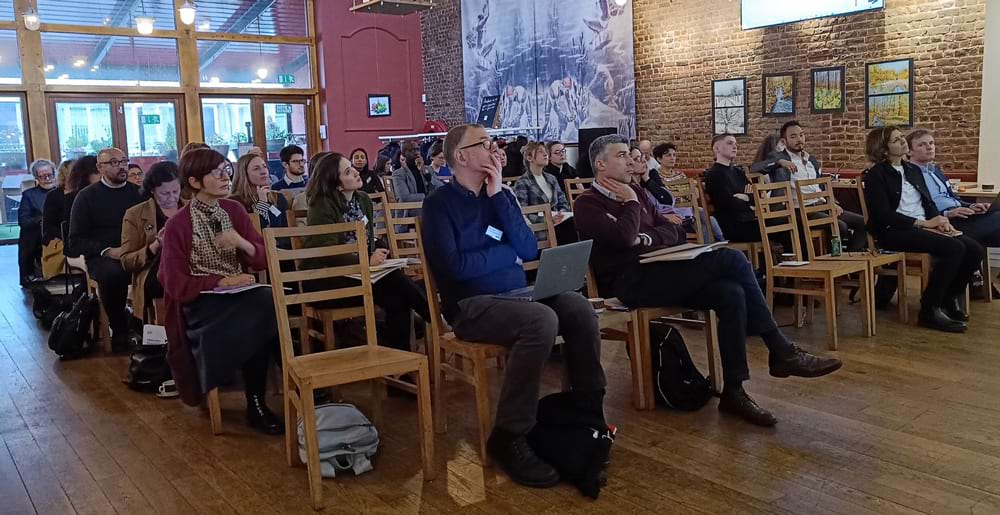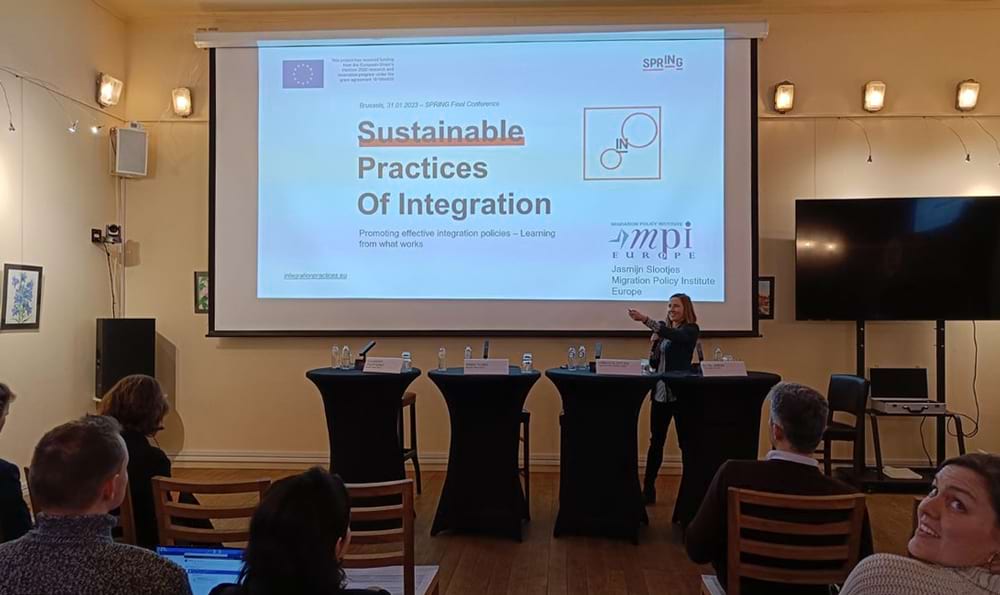A two-year journey into Sustainable Integration Practices – SPRING Final Conference: Presentation of tools and lessons learnt
The SPRING Final Conference took place on 31st January in Brussels, Belgium. This event was attended by over 50 invested partners and stakeholders in the area of integration practice, coming from the research, practice, and policy-making fields from various countries in Europe and America. It allowed practitioners to learn about the SPRING results and tools, identify and connect with key integration stakeholders, access curated knowledge on integration and get inspired by good practices.
Guia Gilardoni (ISMU & SPRING Project Coordinator), summed up the SPRING project in four words:

People, bringing together actors who work in the field of migrant integration, to improve the effectiveness and sustainability of their work.
Knowledge, a combination of academic on practical knowledge on migrant integration with a view to make it accessible, as evidenced by the Handbook for practitioners.
Practices, the opportunities to learn what is still missing and better capitalise on previous work, this is what the Good Practice adaptation toolkit aims at achieving.
Evaluation, to be able to reflect on the work done, to understand what worked well and where there was room for improvement.
To set the scene, Justyna Segeš Frelak (ICMPD) and Adham Aly (Erasmus University Rotterdam) gave an overview of the aims and outcomes of the SprINg project. The project started by mapping the knowledge gaps that exist for practitioners working in the European immigration landscape. To do this, SPRING identified and engaged with over 1600 stakeholders based in18 Member States. There was an overwhelming agreement that they were lacking knowledge in relation to transferability, funding opportunities and the wider structural elements of migrant integration. Communities of Practice (CoP) which are groups of people who share the same passion and concern for what they do, and want to learn how to do it better, were identified as the best solution to knowledge gaps. The co-design trajectories were implemented with this idea of CoP, to design solutions to a problem with people who are experiencing the problem, to be able to create a long-term policy impact. Within migration, the problem just like the solution is complex, and therefore to achieve the desired outcomes, we must reach an understanding in which migrants are already citizens and have a place at the table to shape the policy which impacts them, to move from becoming to being, from integration to inclusion.

To allow the knowledge to be used, it had to be synthesised. Albert Kraler (University for Continuing Education Krems) and Asya Pisarevskaya (Erasmus University Rotterdam) described this process where they identified the integration sub-topics which were relevant for newcomers and useful for practitioners who were working on the ground and conducted a massive literature review.. The SPRING evidence repository came out of this process. It provides a summary of the most relevant aspects and featured publications for 11 integration topics. The Handbook for practitioners then came as a more handy, physical version of the repository, featuring for each topic, an overview of existing good practices and actionable policy and practice recommendations. The question of access to relevant knowledge on migrant integration is also a crucial issue for small and rural communities, generally less prepared for the integration of migrants and less interconnected, as explained by Tiziana Caponio (Turin University, coordinator of the H2020 WHOLE-COMM project).
Providing evidence for the processes of Integration, Petra Hueck (ICMC-Europe/Share Network) and Eliza Bateman (The Refugee Hub, University of Ottawa) presented the community sponsorship systems in Europe and in Canada, how they work and what we can learn from these systems. Community sponsorships come as a great example of successfully transferred practice, as they have been emerging in Europe post 2015 taking inspiration from the Canadian model developed over the past 30 years. The sponsorship systems in Europe are rather fragmented and led by Civil Society Organisationsin partnership with authorities, while In Canada the process has been more mainstreamed, and is mainly sponsored by the diaspora community.
Finally, members from the SprINg consortium Jasmijn Slootjes (Migration Policy Institute Europe) and Sinem Yilmaz & Alexander Wolffhardt (Migration Policy Group), associated partner Rossella Nicoletti (EUROCITIES) and invested stakeholder Prachi Gajendra Metawala (United Cities and Local Governments – UCLG) discussed how to bridge the research-practice gap, to give the right tools to practitioners, and ultimately inform positive change to people’s lives.
Evaluations are being carried out and evidence produced but the results are not being disseminated to those who need it. The toolkit and Handbook are steps in the right direction, to be able to share the results of the research done for the people who need it. Recognising what makes a practice ”good”, and what elements can be transferred, is part of the process of adapting an existing practice to a different organisation, thematic area or region. Practitioners must ask themselves specific questions, assessing the particular conditions for the emergence of the good practice in the origin context, and the potential for adaptation to a destination context. This is seen most meaningfully in cities, the primary level of action for integration. Here, networks like EUROCITIES and UCLG are key to bridge the gap by allowing invested stakeholders to meet and learn from each other, access relevant knowledge, as well as influence policy and political will on the ground.
This was followed by an open debate on how to bridge the gap between practice and research, policy. Among the main points that emerged from the discussion were:
- the need to include storytelling into the evidenced-based argumentation to approach policymakers with human-centered focus.
- a reflection on the value of research, and the privileged position of researchers in speaking truth to policy-makers
Concluding Remarks by Peter Scholten (Erasmus University Rotterdam) underlined the need to tear down the walls between research and practice and to create sustainable ecosystems, in order to prepare jointly for future challenges regarding the inclusion of all migrants. Only together will we be able to create this shared future and culture.

The SPRING Project Sustainable Practices of Integration) has received funding from the European Union’s Horizon 2020 research and innovation program under the grant agreement 101004635.



